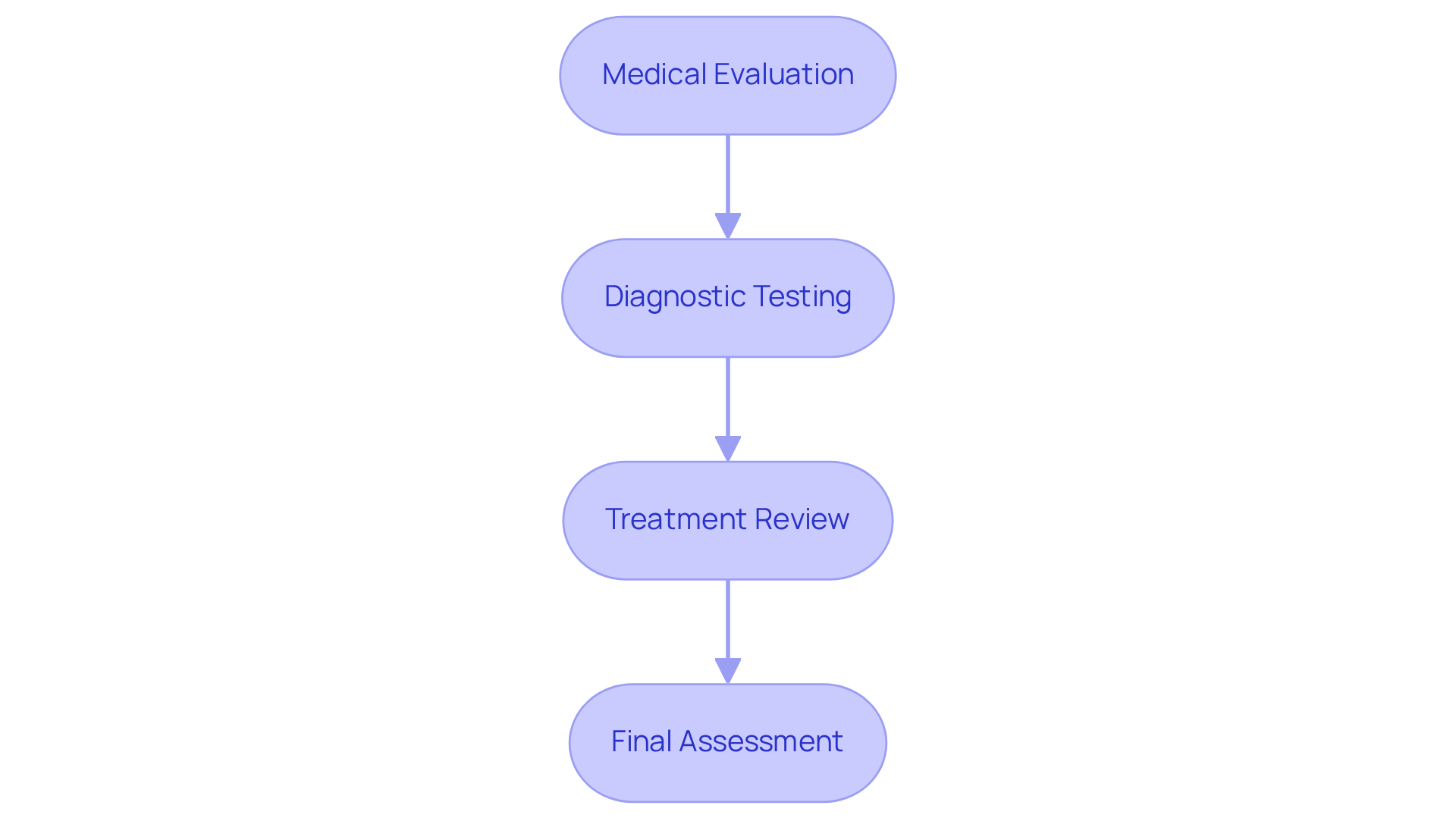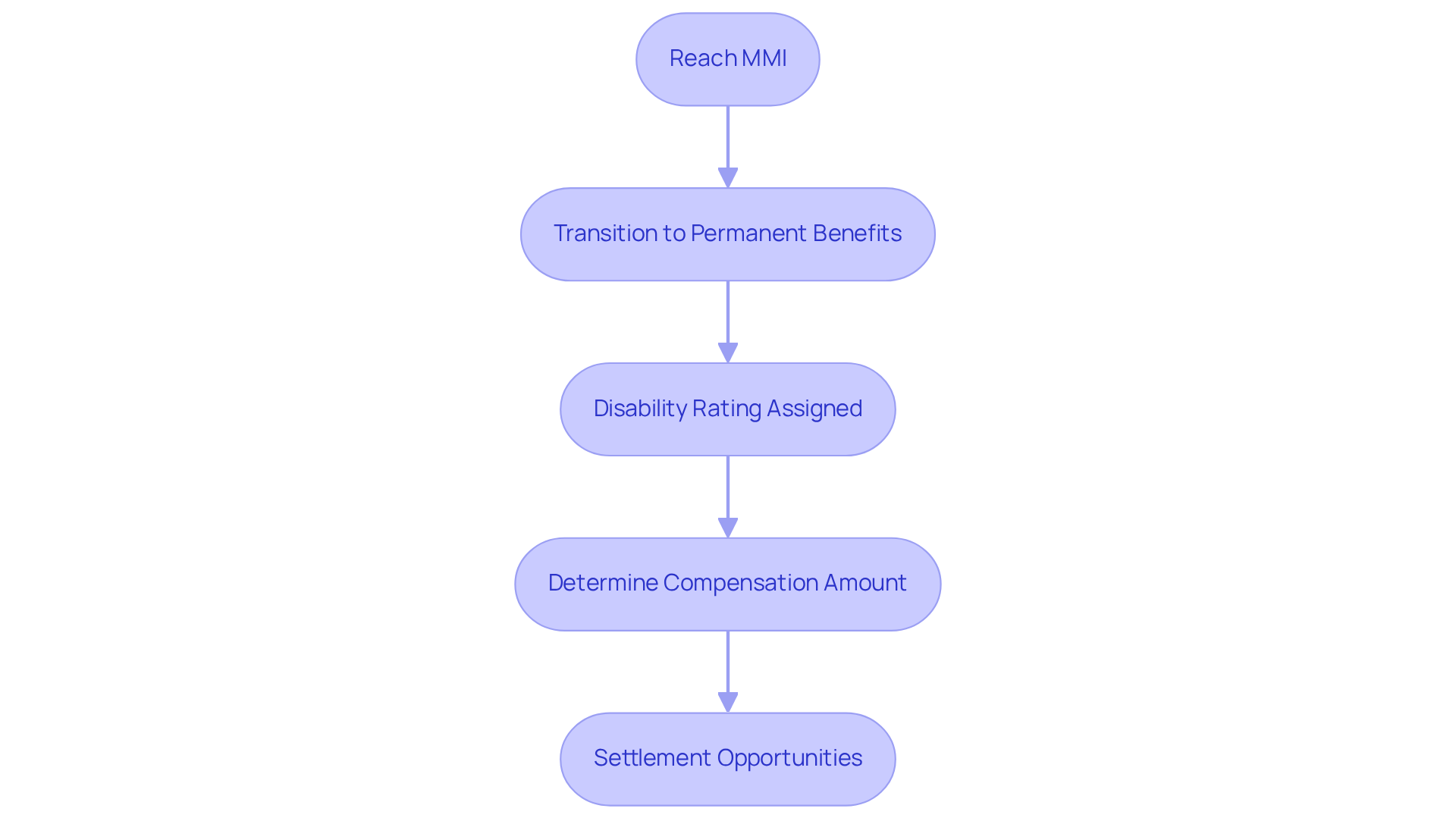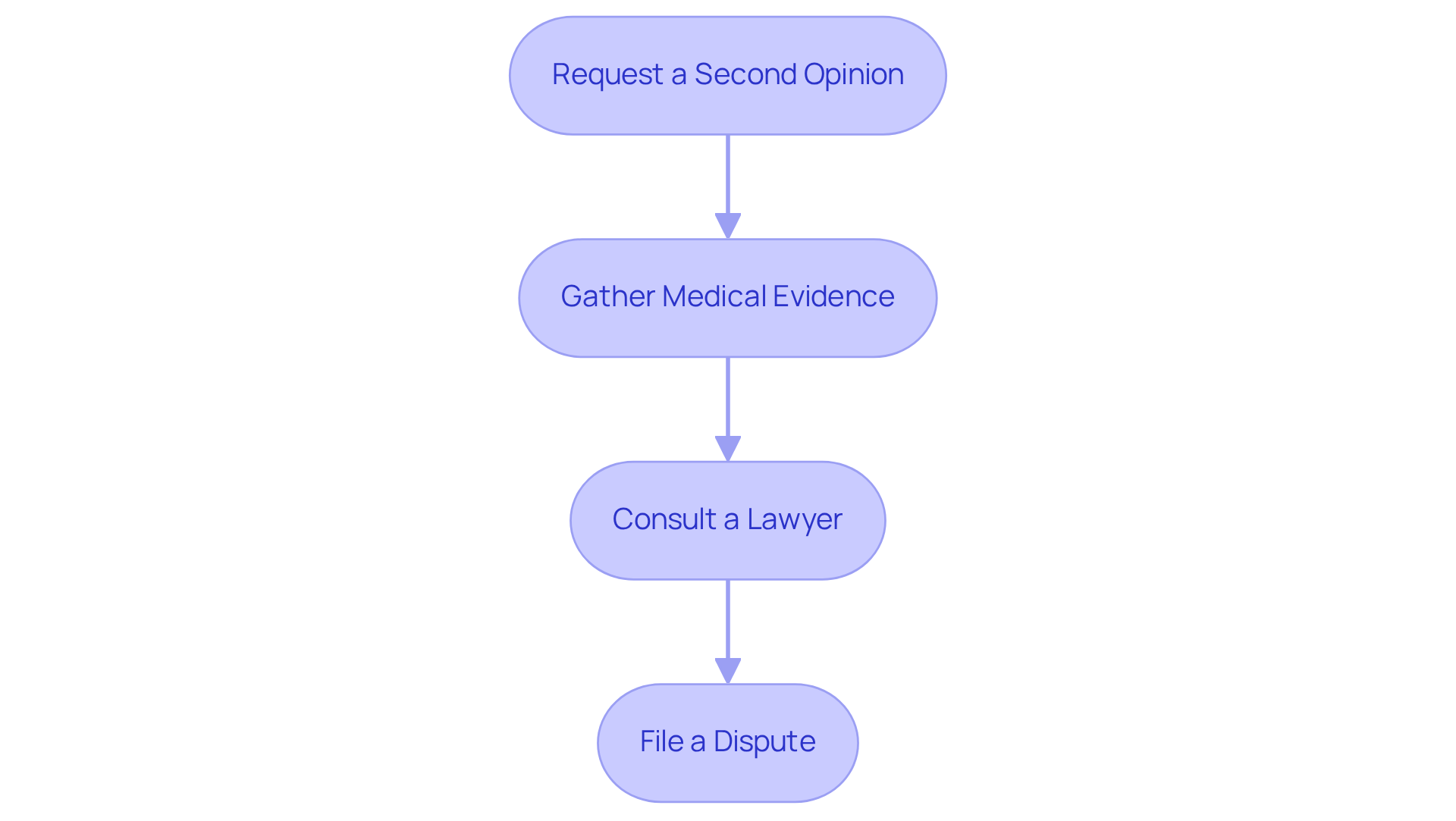Overview
This article sheds light on the crucial concept of Maximum Medical Improvement (MMI) within the realm of workers' compensation. For healthcare workers navigating recovery and benefits, understanding MMI is essential. MMI signifies a stable medical condition where no further significant improvement is anticipated. This directly impacts eligibility for benefits and the transition to permanent disability ratings.
Therefore, it’s vital to ensure a proper assessment and consider potential legal support in the event of disputes. Remember, you’re not alone in this fight—we’re here to support you every step of the way.
Introduction
Understanding Maximum Medical Improvement (MMI) is crucial for healthcare workers navigating the complex world of workers' compensation. This vital milestone not only marks the stabilization of an injured individual’s medical condition but also plays a direct role in determining their eligibility for benefits and future treatment options. Yet, the path to achieving MMI can be riddled with challenges, raising concerns about the adequacy of assessments and the potential for disputes.
How can healthcare professionals ensure they fully grasp and advocate for their clients' rights amidst such pivotal determinations? We understand how overwhelming this feels, and we’re here to fight for you.
Define Maximum Medical Improvement (MMI) in Workers' Compensation
(MMI) is a pivotal milestone in the recovery journey for injured individuals. It marks the moment when their medical condition has stabilized, and no further significant improvement is expected with additional treatment. A qualified healthcare provider conducts this assessment after all necessary interventions have been completed. However, reaching MMI does not mean full recovery; it indicates that the individual has achieved the highest possible level of recovery given their specific circumstances.
For healthcare professionals, understanding is crucial as it directly impacts their eligibility for benefits and the subsequent stages of their compensation claims. Research shows that approximately 70% of healthcare professionals reach MMI after their injuries, significantly affecting their ability to return to work and the type of support they may receive. With an employee getting injured every 7 seconds in the U.S. and , the urgency of cannot be overstated.
Consider the real-life scenario of a nurse who suffered a back injury and achieved MMI after extensive rehabilitation. This example underscores the . Furthermore, with the in representing injured individuals, is essential for . This ensures that injured individuals receive the assistance they deserve. Remember, immediate action is vital; delays in reporting injuries can jeopardize your legal rights and benefits.

Explain the Process of Determining MMI
Determining is a crucial process that can feel overwhelming. It involves several essential steps designed to support you on your journey to recovery:
- : A healthcare provider conducts a thorough examination of your condition, considering your medical history and treatment progress.
- Diagnostic Testing: Depending on your injury, tests like X-rays or MRIs may be used to assess your current status.
- Treatment Review: The provider reviews the treatments you've received to determine if additional interventions could lead to further improvement.
- Final Assessment: After evaluating all relevant factors, the healthcare provider decides if you have reached MMI, documenting their findings in a medical report. This report is vital for your claim process, serving as official proof of your recovery status and guiding future decisions regarding assistance.
It's important to understand that generally end once MMI is reached, which can significantly impact your . Understanding is essential for a successful compensation claim. Given the complexities involved, including potential disputes over determinations, it's crucial for injured individuals to seek to effectively . The timeline for establishing MMI can vary, so being aware of this can be beneficial for healthcare professionals involved in the process. At , we are dedicated to ensuring you receive the medical care and compensation you deserve under the law. We are here to fight for you against insurance companies.

Discuss the Implications of Reaching MMI on Benefits and Disability Ratings
Reaching (MMI) has significant implications for your and s.
- Transition to Permanent Benefits: Once MMI is established, temporary disability benefits typically end. You may transition to if your condition warrants it, marking a crucial shift in your payment system.
- Disability Rating: At the MMI stage, a permanent impairment rating is assigned, quantifying the extent of your disability. This rating is vital in determining the compensation amount you're entitled to receive; higher ratings often mean greater payments.
- : MMI often paves the way for settlement negotiations. With your medical condition stabilized, it allows for a clearer evaluation of future medical needs and expenses, making discussions about compensation more straightforward.
Consider real-world scenarios that illustrate these points. For example, after reaching MMI, you might receive a permanent impairment rating that reflects the severity of your injury, which can influence your eligibility for benefits. If your impairment rating is lower than expected, is essential to ensure fair assessments and contest any discrepancies. Legal support during this process is invaluable, providing you with the necessary guidance to navigate complex evaluations and secure the compensation you deserve.
Understanding the nuances of MMI workers comp is critical for managing the intricacies of , as it directly impacts the type and amount of benefits one can obtain. At , we offer and operate on a no-win, no-fee basis, ensuring you can pursue your claims without financial risk.
We’re here to fight for your family. Your future matters to us. Yo Peleo — We Fight.

Outline Steps to Challenge an MMI Determination
If you’re a healthcare worker facing a Maximum Medical Improvement (MMI) determination that doesn’t sit right with you, know that you have :
- : Consider seeking an evaluation from another qualified healthcare provider. This fresh perspective on your recovery status can reveal new insights into your condition and treatment options.
- : Collect additional medical records, treatment notes, and diagnostic results. This comprehensive documentation can bolster your case for further treatment or a , thereby strengthening your argument.
- : is crucial for navigating the complexities of the appeals process. Their legal guidance will empower you to understand your rights and develop the best strategies to challenge the determination.
- : Depending on where you are, you may have the option to formally dispute the MMI finding through the workers' compensation board or an administrative law judge. Presenting your case for reconsideration can lead to a more favorable outcome.
Remember, you are not alone in this fight. We’re here to .

Conclusion
Reaching Maximum Medical Improvement (MMI) marks a vital point in the workers' compensation journey. It signifies that an injured worker has attained the highest level of recovery possible given their circumstances. While this milestone does not mean complete recovery, it indicates that further significant improvement is unlikely. Understanding MMI is essential for healthcare professionals, as it directly impacts eligibility for benefits and the progression of compensation claims.
This article highlights key aspects of MMI, including:
- How it is determined
- Its implications for benefits and disability ratings
- The steps to challenge an MMI determination
From thorough medical evaluations and diagnostic testing to the potential transition to permanent benefits, every element plays a crucial role in shaping the outcome of a worker's compensation claim. Moreover, the importance of legal support cannot be overstated; navigating the complexities of MMI assessments can feel daunting without proper guidance.
Ultimately, grasping the significance of MMI in workers' compensation is crucial. Healthcare workers must be proactive in their recovery and compensation processes. By seeking timely medical care, consulting with legal professionals, and being aware of their rights, injured workers can effectively advocate for themselves and secure the benefits they deserve. The journey through workers' compensation may be challenging, but with the right knowledge and support, it is possible to navigate it successfully. Remember, we’re here to fight for your family and your future matters to us.
Frequently Asked Questions
What does Maximum Medical Improvement (MMI) mean in the context of workers' compensation?
Maximum Medical Improvement (MMI) is the point in the recovery journey for injured individuals when their medical condition has stabilized, and no further significant improvement is expected with additional treatment. It indicates the highest possible level of recovery given the individual's specific circumstances.
Who assesses whether an individual has reached MMI?
A qualified healthcare provider conducts the assessment to determine if an individual has reached MMI after all necessary medical interventions have been completed.
Does reaching MMI mean that an individual has fully recovered?
No, reaching MMI does not mean full recovery; it signifies that the individual has achieved the best possible recovery level based on their condition.
Why is understanding MMI important for healthcare professionals?
Understanding MMI is crucial for healthcare professionals because it directly impacts the injured individual's eligibility for benefits and the subsequent stages of their compensation claims.
What percentage of healthcare professionals reach MMI after their injuries?
Research indicates that approximately 70% of healthcare professionals reach MMI after their injuries.
How common are workplace injuries in the U.S.?
An employee is injured every 7 seconds in the U.S., with 4.6 million workplace injuries reported annually.
Can you provide an example of MMI in a real-life scenario?
An example is a nurse who suffered a back injury and achieved MMI after extensive rehabilitation, illustrating the practical implications of this milestone.
Why should injured individuals consider consulting a compensation attorney?
Consulting a compensation attorney is essential for navigating potential disputes over MMI assessments and ensuring that injured individuals receive the assistance they deserve.
What should injured individuals do if they experience a work-related injury?
Immediate action is vital; delays in reporting injuries can jeopardize their legal rights and benefits.




